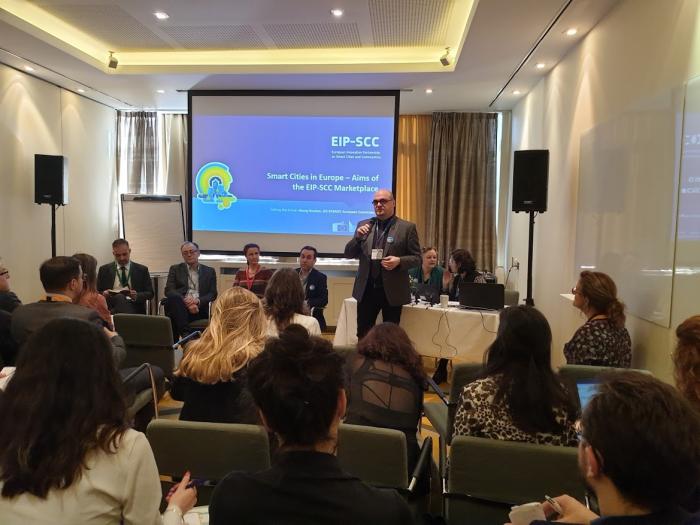
On 18 February 2020, during the Covenant of Mayors Investment Forum, the EIP-SCC Marketplace session “Smart Cities – What’s Next?” took place. It was moderated by Judith Borsboom-van Beurden (Head of Locality, EIP-SCC) and included Ms. Jessica Stromback (Joule Assets), Mr. Jorge Rodrigues de Almeida (EIP-SCC Matchmaking coordinator), Mr. Sergio Olivero (Energy Center of the Politecnico di Torino) and Mr. Francisco Rodriguez Perez-Curiel (Project coordinator of SmartEnCity) as panelists who focused on opportunities for implementation, replication and scaling up for Smart City solutions from different perspectives. The conference was opened and accompanied by Mr. Georg Houben, (EC, DG Energy, Smart Cities & Communities).
During the opening, Mr. Georg Houben underlined the EIP-SCC Marketplace’s importance in helping to accelerate the implementation and replication of Smart City solutions by bringing them close to finance. Subsequently, Mr. Jorge Rodrigues de Almeida focused on the platform’s aim to prepare cities to be able to invest. It is indeed the EIP-SCC Marketplace’s ultimate aim to make concepts investor ready by giving an opportunity for one-to-one meetings with investors to assess the bankability of projects. Ms. Jessica Stromback in turn added that it is a critical issue as well as an important idea to involve the investment community as early as possible since investors will not see the same risks as project developers and cities. Furthermore, Mr. Sergio Olivero emphasised the retrofitting of buildings as a big opportunity for smartness and energy transition in Europe which he underlined by two examples set in Italy that came from two different EU funded projects. According to Mr. Francisco Rodriguez Perez-Curiel the following conditions should be created to enable implementation and replication: Cities do not only have to build the organisational structure to deal with innovation and complex environments but there is also a need to understand the demand for new technologies and how this demand is created by the aspect of convenience. In addition, the jump from demonstration to replication means that the experience needs to be translated to the right language when getting in closer contact with other parts of the government. Therefore, capacity building in governance issues is a must.
A lively open discussion followed on how to pave the way for Smart City projects to finance. It was agreed on the circumstance that it can be difficult to retain the investor’s attention during the implementation phase of a project. Therefore, it was argued whether standardisation (with its advantages on contracting and its disadvantages in connection with acknowledging different needs and realities) as well as clustering can provide solutions for this difficulty. Mr. Carlos Sanchez (Smart Cities Infrastructure Fund) stated that intensifying the work on business models could also help to close these gaps.
The session ended with a brief intervention from the public regarding other sources of financing such as crowdfunding and how this could be combined with more traditional financial sources. Concluding, the panel agreed that there is a need for innovative formulas of financing and that the EIP-SCC Marketplace will continue to trigger meaningful action and exchanges in this area.
Photos by EIP-SCC Marketplace consortium, Steinbeis-Europa-Zentrum
